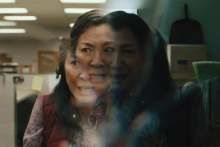purpose

“THE SPIRITUAL LIFE, in other words, is not achieved by denying one part of life for the sake of another. The spiritual life is achieved only by listening to all of life and learning to respond to each of its dimensions wholly and with integrity.”
In this quote from Wisdom Distilled From the Daily: Living the Rule of St. Benedict Today, Joan Chittister writes about living a spiritually active existence that fully engages with our daily reality. She couldn’t have known it at the time, but Chittister might as well have been describing one of the biggest pop culture trends of the last few years: the multiverse.
The concept of multiple worlds and multiple versions of ourselves (some of whom live the life we secretly wish we had) has become ubiquitous across screens, from movies like Doctor Strange in the Multiverse of Madness and Spider-Man: No Way Home to TV shows like Rick and Morty and Doctor Who. Perhaps the example of multiverse storytelling to most successfully plumb emotional possibilities so far — listening to all of life and responding to its dimensions with integrity — is also one of 2022’s most surprising hits: the indie film Everything Everywhere All at Once.
IT’S A MAY evening on the farm. My husband’s planting tomatoes and our son needs a bedtime story, but I’m completely occupied with pictures of war. I’ve cleared the piles of laundry from the kitchen table so our friend Adam can spread out his albums. There are photos of Adam in his tidy platform tent, of brown mountains in the distance, and dozens of pictures of children grinning on the other side of razor wire.
“This is an Aardvark,” he says, pointing to a gargantuan armored vehicle as he describes the flails that detonate buried mines. “What does that do to the soil?” I ask, because this is what you wonder when you and your family have been Mennonite farmers since the Reformation. There are a few more photos before I finally get it. Adam is showing me Bagram Air Base, the U.S. military hub in Afghanistan, surrounded by minefields and littered with burned-out tanks and planes, the wreckage of war from the Soviets. No one farms here, or has, or will for a long, long time.
FOR THE PAST three seasons, Adam McDermott has come to our farm in Central Pennsylvania’s Stone Valley every Friday morning to harvest vegetables for the food bank. We always chat while we bunch beets or pick green beans, and now I wonder why we’ve never talked about his years in the Army.
“This farm has definitely been part of my therapy,” he tells me, while offering a brief sketch of his months in Iraq: taking heavy equipment down unfamiliar roads to set off hidden explosives, being promoted to sergeant, and then losing three friends when a bomb shattered their Humvee. Adam came home in 2008 with Post-Traumatic Stress Disorder (PTSD) and an alcohol addiction. “A lot of guys struggle with alcohol,” Adam says. “In the military you have camaraderie and a sense of purpose. But when you get back, there’s just this big void.”

In a secularized society obsessed with consumerism, entertainment, and modernization, Christianity is often portrayed as being old-fashioned, irrelevant, and useless, but it still serves some very valuable and profound purposes. Here’s why Americans still need it:

The first Christmas after my daughter was born, I got a two-year membership to 24 Hour Fitness as a gift. Included in the membership was one personal training session.
My trainer bristled with annoyance at my “fad diet” when I told him we were going Paleo for three months. Then he showed me to the elliptical machine and told me that he lost weight by drinking sugar-free Kool-Aid all day and ordering off of the light menu at Taco Bell.
Obviously, our philosophies weren’t in line. But I was still able to get some cardio, weights, and an occasional spin class in at the gym. No hard feelings. But staying motivated and committed to working out while staying home with a toddler has been hard.
That might be because I haven’t tried CrossFit.
I think CrossFit is like secular church. It offers more than weight loss or fitness. It speaks to our innate desires for community, purpose, and transformation.

An open letter to my beloved sons, in whom I am well pleased,
I'm writing this fatherly letter about the difference between a career and a vocation. I learned this wisdom from Jim Forest, an old man who was a famous peace activist in the 1960s and walked many of the top spiritual activists of the 20th century. He personally taught me some important lessons on vocation that might be very helpful to you, and he specifically had you three in mind when he shared this.
When I say "career," I mean the idea of a job that you work at to make money, get promotions, become an expert, and eventually retire and earn a pension. There's nothing really wrong with having a career, or even a few careers. For example, you could say I was a "career pastor" for 20 years.
But there is something more important that we call a "vocation." A vocation may also include getting a paycheck and going to a workplace, but there is much more. A vocation is a "calling" that can span over many careers. For example, I think by vocation I am called to teach. I did that as a youth pastor, a church-planter, a college teacher, a seminar facilitator, an author, and a publisher. All of those mini-careers are just the platform I used to live out my calling.